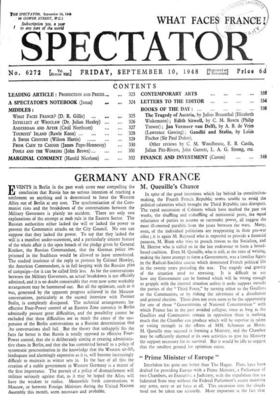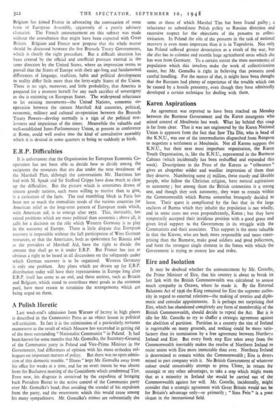" Prime Minister of Europe "
Interlaken has gone one better than The Hague. Plans have been drafted for providing Europe with a Prime Minister, a Parliament of two Chambers, an Executive, a Judiciary, with the stipulation that no federated State may without the Federal Parliament's assent maintain any army, navy or air force at all. This excursion into the clouds need not be taken too seriously. More important is the fact that
Belgium has joined France in advocating the convocation of some form of European Assembly, apparently of a purely advisory character. The French announcement on this subject was made without the consultation that might have been expected with Great Britain. Belgium and France now propose that the whole matter should be discussed between the five Brussels Treaty Governments, which is clearly the right procedure. But a difficult situation has been created by the official and unofficial pressure exerted in the same direction by the United States, where an impression seems to prevail that the States of Europe with their age-long and fundamental differences of language, tradition, habit and political development in reality differ little more than the forty-eight States of the Union. There is no sign, moreover, and little probability, that America is prepared for a moment herself for any such sacrifice of sovereignty as she is enjoining cn European States. The widespread reluctance to let existing movements—the United Nations, economic co- operation between the sixteen Marshall Aid countries, political, economic, military and cultural co-operation between the Brussels Treaty Powers—develop normally is a sign of the political rest- lessness and impatience of the times. Meanwhile the valuable and well-established Inter-Parliamentary Union, at present in conference at Rome, could well evolve into the kind of consultative assembly which it is desired in some quarters to bring so suddenly to birth.



































